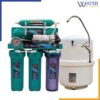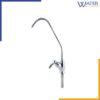Deng Yuan 5 Stage 50 GPD TWD-1250 RO Water Filter
Deng Yuan 5 Stage 50 GPD TWD-1250 RO Water Filter
Product Warranty: 365 Days
Product Brand: Deng Yung
Product Model: TWD-1250
Country of Origin: Taiwan
Purification Stage: 5 (Five)
Purification Technology: Reverse Osmosis
Production Capacity: 50 GPD/ 7.8(±) Liters per Hour
Reserve Tank Capacity: 15 (±) Liters per Hour
Faucet Type: One Handel Stainless Steel Faucet
Water Connection Size: 06 mm
Operating Power: 220V (DC-24V 1.2mA)
Certifications: SASO, ISO14001, ISO9001
Are you looking for a water filter that provides purified water while also being affordable? If so, the Deng Yuan 5 Stage 50 GPD TWD-1250 RO Water Filter might be the perfect option for you. In this article, we will discuss everything you need to know about this water filter, including its features, benefits, and drawbacks.
1. Introduction
Clean drinking water is essential for our health and well-being. However, not all tap water is safe for consumption. Harmful contaminants such as bacteria, viruses, chemicals, and heavy metals can be found in tap water, making it unsafe for drinking. This is where water filters come in. They are designed to remove these contaminants and provide purified water that is safe for consumption. One such water filter is the Deng Yuan 5 Stage 50 GPD TWD-1250 RO Water Filter.
2. What is the Deng Yuan TWD-1250 50 GPD RO Water Purifier
The Deng Yuan TWD-1250 50 GPD RO Water Purifier is a reverse osmosis water filtration system that uses a five-stage filtration process to remove contaminants from tap water. It is designed to remove up to 99% of impurities, including bacteria, viruses, chemicals, and heavy metals.
3. How does the Deng Yuan 5 Stage 50 GPD TWD-1250 RO Water Filter work?
The Deng Yuan 5 Stage 50 GPD TWD-1250 RO Water Filter uses a five-stage filtration process to remove contaminants from tap water. This process includes a sediment filter, granular activated carbon filter, carbon block filter, reverse osmosis membrane, and post-carbon filter.
4. The Five Stages of Filtration
Stage 1: Sediment Filter
The first stage of filtration involves a sediment filter that removes large particles such as sand, dirt, and rust from the water. This helps to protect the other filters from damage and ensures that they function effectively.
Stage 2: Granular Activated Carbon Filter
The second stage of filtration involves a granular activated carbon filter that removes chlorine, odors, and other impurities that affect the taste and smell of the water.
Stage 3: Carbon Block Filter
The third stage of filtration involves a carbon block filter that removes residual chlorine, trihalomethanes (THMs), and other chemicals that may be present in the water.
Stage 4: Reverse Osmosis Membrane
The fourth stage of filtration involves a reverse osmosis membrane that removes up to 99% of impurities such as bacteria, viruses, heavy metals, and other contaminants.
Based on 0 reviews
Only logged in customers who have purchased this product may leave a review.













There are no reviews yet.